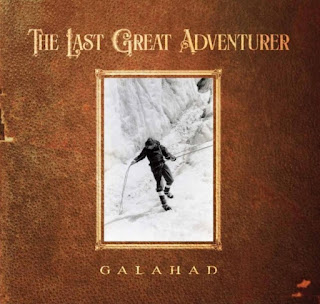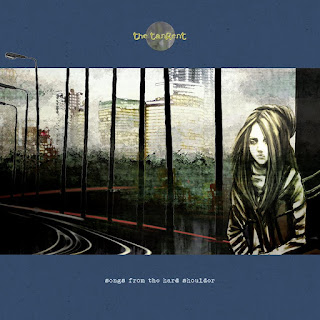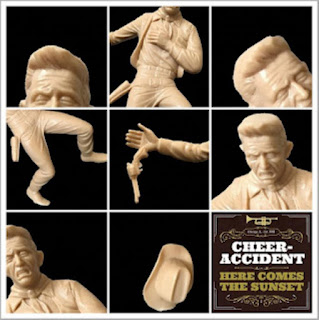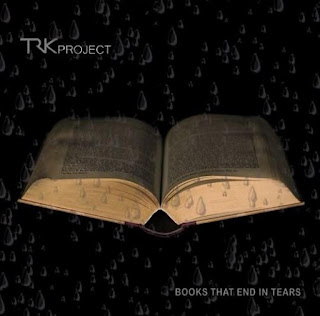Prog's debt to classical music.
When opening an exposition on the origins of anything in the world of progressive rock music one would be remiss to not first and foremost acknowledge the tremendous examples and contributions coming from the world of what we call "classical" music--especially the Western or European traditions of classical music. The complex, multi-dimensional aspects of classical music "storytelling" have been well known to us since the advent of the Mass, the suite and sonata, as well as the symphony and opera. All of these forms have informed, inspired, and been emulated by rock and progressive rock artists--especially those musicians who grew up with training fundamentals coming from classical music traditions or who were educated in the music schools of institutions of higher learning.
Musicians feel inspired to create in long song forms.
The biggest inspiration for rock musicians to make long-playing, multiple--themed suites or epics or mesmerics is, of course, the world of classical music--especially the model of the symphony and the opera or operetta. Since many of the musicians entering the electrically-infused world of rock music were coming from training in classical background, this made sense. Even the musicians who had early on made the transposition into the jazz world were able to find plenty of examples of long-playing song forms (though not necessarily "epic" or theme-shifting), the freedom to extend one's jams to long, even side-long, lengths (about 18 minutes was considered the standard limit for vinyl recording) had been pioneered by the likes of many jazz artists, including, and most famously, Ornette Coleman (especially with 1959's The Shape of Jazz to Come and 1961's Free Jazz) and John Coltrane's Giant Steps as well as Don Cherry's The Avant-Garde.
Prog's debt to literature and oral tradition.
Though the musical forms expressed by bards and itinerant entertainers, troubadours and traveling minstrels, court musicians and storytellers were typically short or monothematic, the phenomenon in literature known as the "epic" or "saga" has been known since the times of Gilgamesh, the ancient Vedas, the Hebrew Tanakh with its Pentateuch, the Upanishads, Homer's Iliad and Odyssey, Hesiod, Herodotus, and the Greek playwrights. They were then carried forward by the likes of Virgil, Beowolf, the chanson geste by Turold known as The Song of Roland (Le Chanson de Roland), Chaucer's Canterbury Tales, Sir Gawain and The Green Knight, Corneille's El Cid, One Thousand and One Nights, and many oral and written religious and mythological traditions.
Prog's association with long-playing song forms.
The use of the term "epic" within the world of music--and especially within Prog World--is especially loose and, actually, often quite inappropriate. For example, the improvisational jazz departures of Ornette Coleman or the "prayers" of John Coltrane, the mathematical equations of Terry Riley, Steve Reich, or Phillip Glass, as well as the chant-like songs common to many "Krautrock" bands (I much prefer the German artists' original description for their music: "Kosmische Musik")--especially the ones experimenting with the desired achievement /facilitation of trance and hypnotic states similar to those sought after by musically-supported Eastern meditation traditions--or the long jam songs by the likes of The Grateful Dead, Phish, and some psychedelic bands ("Inna gaddda da vida," Hypnos 69, Cosmic Ground, Samsara Blues Experiment, My Brother the Wind, the Invisible Opera Company of Tibet, and even the Dave Matthews Band and early Pink Floyd as well as many others) cannot be accurately included under the umbrella of "epic" song compositions as they do not have component parts, multiple scenes or motifs, or the typical conflict and resolutions common to heroic journeys with sprawling story lines. And yet, no one, so far as I know, has ever come up with a better, alternative, or different term to encompass the many other non-epic forms quite commonly found in long-playing songs found in the hundreds within the various sub-genres that are under the Progressive Rock Music moniker.
A new term.
After much thought, research, and deliberation, I have decided to create a separate term with which to connote the long musical expressions that are so commonly used by bands/artists that fall under the many sub-genres of "progressive rock music"; that term is "mesmeric."
Defining the mesmeric.
A mesmeric will constitute a long-playing song (seven to 72 minutes in length) in which the artist uses non-poetic, non-rhyming, minimally-shifting rhythmic patterns, usually- or mostly-instrumental in nature, musical forms in order to express their joys, frustrations, aspirations, Divine/Cosmic yearnings as well as their urges/"needs" for escape, distraction, or anæsthetization. If a long-playing piece of music is not befitting of the "epic" or "suite" designations due to qualities lacking, they can and will be relegated to the "mesmeric" category for description and identification. Thus, Tangerine Dream, Alio Die, Klaus Schulze, Samsara Blues Experiment, My Brother The Wind, Amon Düül II, Terry Riley, Steve Reich, Phillip Glass, Stephen Thelen, "awakened" John Coltrane, Pharoah Sanders, Herbie Hancock's Mwandishi sextet, Miles Davis, and even The Doors and Iron Butterfly created mesmerics, not epics; their long-playing musical expressions worked to bridge the gap between human frustration and Divine adoration, between palliative self-indulgence and hopeful prayer--they trick the listener (as well as the performer) into a trance-like state that can lead to both pacification and rapturous elation, numbness and/or bliss.
Global musical traditions and their influence on Rock 'n' Roll musical traditions during the 1960s.
The adventurous and experimental Sixties of course were also being strongly infused by the new influx of world musics--especially those coming from the Indian subcontinent (Ravi Shankar and Ustad Ali Akbar Khan) and the Latin musics coming out of Brazil and other South and Central American and Caribbean countries (Antonio Carlos Joabim, Sergio Mendes, Dezi Arnaz, Tito Puente, Mongo Santamaria, Buena Vista Social Club) as well as through the African musicians making their way to the UK and USA via the likes of Babatunde Olatunji, Hugh Masakela, and others. The storytelling capacity of film and theater soundtracks were also providing inspiration for many musicians to "tell a story" with their music, inciting suites in the same way a stage play would have scenes or a book have chapters.
Obviously, the examples, traditions, and pioneers were out there. What has yet to be definitively determined is the tie-in of the first evidences of long-playing song forms with the birthing progressive rock music scene. The purpose of this article is to achieve such evidence. Below you will find a Timeline which attempts to make public the results of my own personal findings as they stand thus far.
A Progressive Rock Timeline.
1955 - Usted Ali Akbar Khan's Yehudi Menuhin-sponsored trip to the United States in 1955 was a major eye-and ear-opener.
1956 - Ravi Shankar - Yehudi Mehuhin's initial top choice to introduce Indian Classical Music to the West, Shankar eventually crossed the Pacific and proceeded to perform, teach, and record many albums, beginning with 1956's Three Ragas, released by World Pacific Records. 1962's Classical Indian Music, Music of India, Improvisations, are a few of the album releases that followed. His appearance in June of 1967 at the Monterey Pop Festival is legendary for the powerful and lasting impressions made on many in attendance--including many of the other artists and budding musicians.
September 1961 - Ornette Coleman. The release of Free Jazz: A Collective Improvisation announced the arrival of a nascent avant garde movement in jazz, also called "Free Improvisation" in Europe. The album contained two side-long songs: "Free Jazz (part One)" (19:55) and "Free Jazz (Part Two)" (16:28). Several of his successive albums, including Ornette! (1962) and Chappaqua Suite (1966), as well as his live albums, continued to explore expanded lengths for the capture of his experimental "liberated" sound.
1961 - 1968 - John Coltrane - "Africa" (1961), "Olé" (1961), Settin' the Pace (1961) all included long-playing original compositions. 1962's Lush Life and My Favorite Things both showed John experimenting with expanded, extended versions of some jazz/pop standards. With 1963's Impressions John really broke into his own with the 14-minute "India" and 15-minute "Impressions" (both recorded from live performances a The Village Vanguard). 1964 brought us "Black Pearls," 1965 A Love Supreme, 1966 Ascension, and "The Father Son and the Holy Ghost" from Meditations. "Kulu Sé Mama (Juno Sé Mama)" and "Selflessness" came from 1967's Kulu Sé Mama, "To Be," "Expression," and "Number One" from the 1967 album Expression. Om was a posthumous release of previously recorded but unreleased material that was pulled together by John's widow, Alice, and released in 1968. "Manifestation" was also released posthumously, later in 1968.
1963 - 1969 - Sun Ra (& his Arkestra) frequently experimented with long-playing formats in their space-jazz improvisations--even committing many of them to albums in studio forms--including: When Angels Speak of Love (1963), Other Planes of There (1966), "The Magic City" (1966), The Heliocentric Worlds of Sun Ra, Volume Two (1967), "Strange Strings" (1967), "Atlantis" (1969).
1964 - Terry Riley. Influenced by John Cage and Karlheinz Stockhausen, Terry Riley debuted and released his composition "In C." It was then performed and, eventually, recorded by several artists.
1965 - 1969 - Pharoah Sanders - bursting onto the jazz scene with his debut solo album in 1965, Pharoah (also known as Pharoah's First), which included two 23+-minute long songs, "Seven by Seven" and "Bethera," Pharoah Sanders soon met and worked with experimental genius John Coltrane. Soon came 1967's Tauhid from which the epics, "Upper Egypt and Lower Egypt" and "Medley: Aum/Venus/Capricorn Rising" came, and then 1969's Karma, from which we have the 33-minute masterpiece, "The Creator Has a Master Plan (Parts One and Two)."
May 17, 1965 - Herbie Hancock - at age 24, pianist Herbie Hancock recorded the concept album, Maiden Voyage, with Rudy Van Gelder and Blue Notes Records. With the five songs on the 42-minute long album, Herbie has said that he was trying to capture an oceanic atmosphere.
March 14, 1966 - The Byrds release "Eight Miles High." The direct influence of both Ravi Shankar's Indian classical music and John Coltrane's song "India" are well documented.
September 18, 1966 - Don Ellis - The influence of the Don Ellis Orchestra's performances in 1966 at the Monterey and Pacific Jazz Festivals (September 18 and October 18, respectively) is legendary. Much is captured on two 1967 album releases entitled, "Live" at Monterey! (1967) and Live in 3 2/3 / 4 Time (1967).
After traveling and touring through Europe and the USA in the late 1950s and early 1960s, Don entered graduate studies in ethnomusicology at UCLA in 1962 where he studied with Indian musician Harihar Rao. After publication (with Rao) of the article in 1965 entitled, "An Introduction to Indian Music for the Jazz Musician," Don moved back east and proceeded to participate in several big band formats as well as some Third Stream projects, including working with Leonard Bernstein, Larry Austin, Gunther Schuller, and Zubin Mehta. With a move back to California, Don formed the Hindustani Jazz Sextet with Rao, while at the same time he brought together his expanded/big band Orchestra--which broke out to public acclaim at the aforementioned 1966 Monterey Jazz Festival. The Orchestra format then proceeded to release three studio albums with the Columbia Record Company during the following years of 1967 and 1968, Electric Bath (1967), Autumn (1968), Shock Treatment (1968), which included no less than six multi-dimensional songs of no less than eight minutes each--one, Autumn's "Variations for Trumpet"--coming in just shy of 20-minutes. Together with the two live albums released during this same period, "Live" at Monterey! (1967) and Live in 3 2/3 / 4 Time (1967) contained no less than six songs of over eight minutes in length, thus firmly establishing Don as one of jazz-rock-fusion's major pioneers of the long-playing format.
June 27, 1966 - Frank Zappa & The Mothers of Invention's double album release, Freak Out, contained two suites of over ten minutes in length (including "The Return of the Son of Monster Magnet" at 12:17);
May 26, 1967 - Frank Zappa & The Mothers of Invention' emphasis on their first 1967 album release, Absolutely Free, was on interconnected movements and is thus broken down into two 17-minute, side-long "mini-suites": "Absolutely Free" and "The M.O.I. American Pageant."
January 4, 1967 - The Doors - their eponymously titled debut album was released containing the long-playing 11:48-minute long song, "The End."
August 4, 1967 - Pink Floyd was already known for their extended psychedelic jams in their live performances when, on this date, The Piper at the Gates of Dawn was released.
August 7, 1967 - Frank Zappa. The date of Capitol Records' short-lived/temporary release of Lumpy Gravy from Frank Zappa's "Abnuceals Emuukha Electric Symphony." With its musique concrète samplings woven within and between the orchestral compositions, the album amounted to two sides of one continuously playing song or "radio play." Due to law suits from Frank's record label, MGM Records, the album was pulled, held, re-edited, and re-released on the proper label, Verve (a subsidiary of MGM), in June of 1968.
November of 1967 - The Moody Blues' Days of Future Passed was released on Deram Records (a subsidiary of Decca).
November 17, 1967 - several versions of Terry Riley's "Poppy Nogood" debuted as part of a live concert series in Boston, MA on November 17, 1967. "Poppy" was finally recorded in 1968 and released in 1969 as one of the two side-long songs on A Rainbow in Curved Air, (the other being the title song).
November 27, 1967 - Jefferson Airplane released After Bathing at Baxter's which contained the 12-minute suite "How Suite It Is" (including "Watch Her Ride" & "Spare Chaynge").
December 1967 - Fifty Foot Hose release their only album, Cauldron using many experimental instruments and their sounds as devised by leader Louis "Cork" Marcheschi, who was influenced and obsessed with sound manipulations as pioneered by his heroes, Edgard Varèse (also a hero of Frank Zappa), John Cage, Terry Riley, and George Antheil. The album contained the 10-minute song, "Fantasy."
January 1968 - saw the release of Ultimate Spinach's eponymously titled debut album from which we could hear the eight minute psych jam entitled, "Ballad of the Hip Death Goddess."
June of 1968 - Ultimate Spinach released their sophomore album, Behold & See, with its three long songs, "Jazz thing," "Mind Flowers" (9:40), and "Suite: Genesis of Beauty (in four parts)." The album was came was released only five months after the band's afore-mentioned debut.
June 14, 1968 - Iron Butterfly releases In-a-gadda-da-vida, which, of course, contains the side-long jam extravaganza of the same name (17:05).
September 1968 - saw the release of Procol Harum's sophomore album, Shine on Brightly, containing the 17-and-a-half-minute long epic suite, "In Held 'Twas I."
October 16, 1968 - The Jimi Hendrix Experience releases its third studio album, Electric Ladyland, on which the band experiments with some longer song formats, including a 14:50-long version of "Voodoo Chile" and "1983 … A Merman I Should Turn to Be" (13:25).
November 1968 - The Nice released Ars Vita Longa Brevis from which we get the side-long epic suite, "Ars Vita Longa Brevis - Symphony For Group And Orchestra" (18:20).1969's The Prisoner (recorded in April, directly after and as a reaction to the assassination of Rev. Martin Luther King, Jr.) shows Herbie Hancock at it again: exploring long-playing musical expressions, but it was with the "Mwandishi" sextet that he produced from 1971 through 1974 that he did his most liberal exploration of the long-playing format.
November 1969 - Colosseum, a British jazz-rock combo, released their sophomore album, Valentyne Suite, (within the same year as their debut, Those Who Are About to Die, We Salute You) which contains a side-long epic suite on Side Two, the album's title track (16:54). Very skilled musicians performing a fully-developed epic, albeit instrumental, composition.
January 1970 - Ian Carr's Nucleus released its debut album, Elastic Rock containing the 8:11-long jazz-rock classic, "Torrid Zone."
March 30, 1970 - Miles Davis Bitches Brew. Recorded in August of 1969--just six weeks after the 1969 Newport Jazz Festival where Miles and his new lineup were exposed to the evolving, "progressive" music of the likes of blues guitarist John Mayall, Frank Zappa's Mothers of Invention, jazz-fusion pioneer Gary Burton, as well as Miles' latest obsession, Sly and the Family Stone. (It is highly unlikely that he saw the Sunday night performance of Led Zeppelin as it took place more than 24 hours after his own stage set; it is unlikely that Miles, Betty, and band stayed past Saturday.)
Bitches Brew contained four sides of raw jazz improvisational music performed by an expanded lineup that included (at times) three electric piano players (Joe Zawinal, Chick Corea, and on "Spanish Key" and "Pharoah's Dance," Larry Young) two drummers (Jack DeJohnette and either Lenny White, Don Alias, or Billy Cobham [on "Feio" only], two bass players (Harvey Brooks on electric and Dave Holland on acoustic double bass) and two percussionists (Don Alias and Juma Santos) as well as three horn and wind players (Miles on trumpet, Bennie Maupin on bass clarinet, and Wayne Shorter on soprano saxophone). The double album plus bonus track (on the CD release) contains no less than six songs over 11-minutes long--three of which are 17- to 27-minutes long!
June 1970 - The Soft Machine release their double album masterpiece, Third, with its four side-long songs.
January 1971 - Emerson, Lake and Palmer's eponymously-titled debut album. With this album, the British supergroup began to let the world know the kind of potential forms and heights to which musical hybridization could take.
1971-74 - Herbie Hancock's Mwandishi sextet releases Mwandishi (March of 1971), Crossings (1972), and Sextant (1973) trilogy as well as trumpeter Eddie Henderson's Realization (1973) and Inside Out (1974), and, to a lesser extent, Bennie Maupin's Jewel in the Lotus (1974)--all milestones in the Jazz-Rock Fusion catalogue--all of which liberally explored long-song formats.
1971 - New Trolls Concerto grosso per i New Trolls. The Italian band New Trolls had been around a while--had in fact already released two albums, the first of which--a concept album--is credited with helping to usher out the dominant Beat music and open the doors for the progressive rock music scene to enter--but it was with this, their third album that they set the bar for progressive rock music albums in Italy and perhaps even wider audience. To this day the album is considered a classic, a masterpiece, and one of the most important album releases in the Italian prog rock scene. The album contains two side-long suits: the four-movement "Concerto grosso" with its classically-modelled four movements and the 20-minute, supposedly improvised, "Nella Sala Vuota."



















